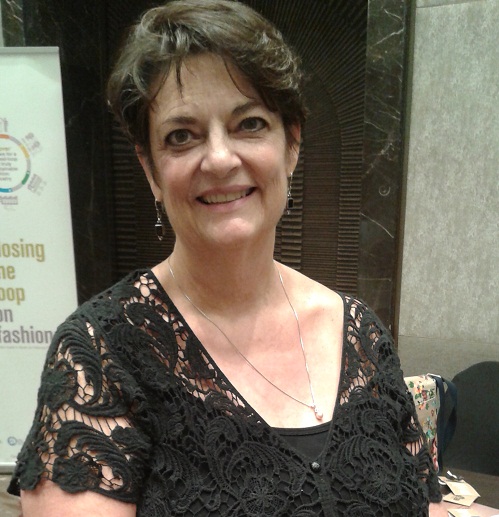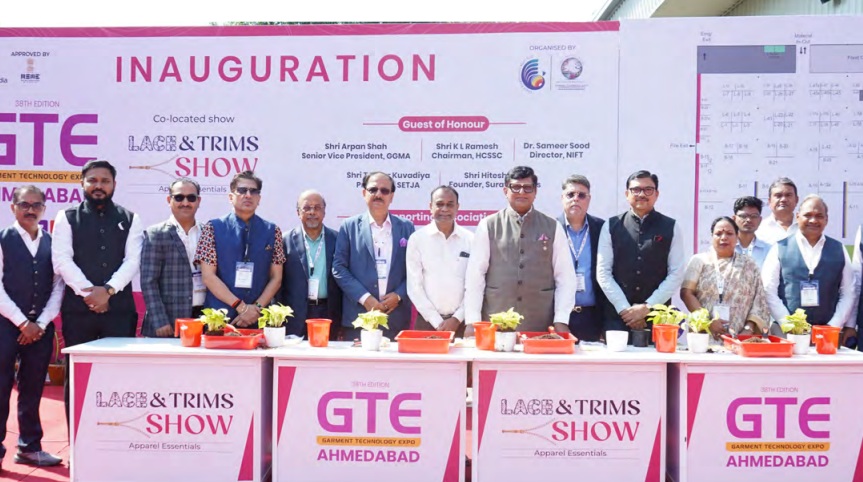FW
The newly-elected President of the Bangladesh Garment Manufacturers and Exporters Association (BGMEA) Md Siddiqur Rahman, and other leaders were visited by the Ambassador of the Netherlands to Bangladesh Leoni Margaretha Cuelenaere, recently. Faruque Hassan, BGMEA Senior Vice-President, Directors ANM Saifuddin and Miran Ali were also present at the time.
BGMEA Vice President (Finance) Mohammed Nasir who was present at the meeting said that it was only a courtesy call and they discussed how Bangladesh's exports to the Netherlands could be increased. Besides, they also discussed issues relating to product prices and further market expansion to the Netherlands.
Now, after the security concerns, Nasir said that many foreign buyers were again coming to Bangladesh. Many international buyers were wary of going to the country after the killing of two foreign nationals, one Italian and a Japanese, in Dhaka, recently.
Nasir, the Managing Director of Evergreen Sweaters, said that Ambassador of the Netherlands to Bangladesh visited their office without any security personnel and discussed RMG issues with the BGMEA leaders. Syed Nurul Islam, Chairman and Chief Executive Officer of the Well Group however said that there were certainly some issues after the killings and that some international buyers were asking for meetings abroad in countries such as China or Hong Kong for their convenience.
www.bgmea.com.bd
China’s demand as the textile manufacturing hub is waning as Chinese workers are asking for a hike in wages and thus, local manufacturers are moving to other countries.
Higher pay, a stronger currency (it was 8 to 1 in the mid-2000s and is now 6.3 to 1) and Beijing’s desire to become a more automated, and high-tech society are all pushing clothing manufacturers to Vietnam and Bangladesh. However, Bangladesh is China’s biggest rival in shirts and sneakers.
Some large clothing retailers with global coverage have moved a portion of their production to Bangladesh and have gradually reduced their use of Chinese factories, as per CEIC data. The China contractor is taking their know-how and collaborating with firms elsewhere to keep the business of the big western clothing brands, in some cases. While in others, western brands are finding Bangladeshi companies on their own building new relationships.
Labour-intensive products have been produced by China and it has been selling them across the globe since the seventies. Subsequently, it has increased and through the decades gained market share. Trade volume as a share of GDP kept rising to a peak of 64.8 per cent in 2006. However, it declined steadily to 41.5 per cent in 2014.
The financial crisis in 2007-08 was one of the reason for the decline and another was that the wages of Chinese garment workers doubled, resulting in higher costs of production according to CEIC reports. The Chinese labour force has stepped up on productivity and skill level to compete in other industries.

A thirteen year old company, Textile Exchange believes in using textiles as a catalyst, as a means to create change. “Originally Textile Exchange was an organic exchange and our focus was on organic cotton. We felt organic cotton should be a market-driven solution to address issues such as the use of pesticides and water. Crop rotation was a vital issue. When you think of the way textiles are produced or manufactured, there was no vision of long term resource planning or for the well-being of people on the planet,” explains Pepper.
Perspective on India

Pepper says that some projects in India are quite good where farmers get training and education and a price for their product. However, she explains, at the same time there are projects that don’t have a strong market linkage and support. “We recommend farmers don’t grow cotton unless they have a strong market partner and clear market signals. There is an issue about availability of resources, of non-GMO seed. The GM folks all over the world have not been diligent about keeping their seeds segregated. A farmer may think he’s getting bad non-GMO seed because there’s been carelessness and neglect in its handling. The bottom-line is that that GMO is basically polluted and leads to contamination,” Pepper states.
She adds that basically the cotton seed supply is polluted and we are the victims of this situation. “It is a serious issue in India. We want Indian businessmen to say that these policies are endangering our business. There has to be a collective action. We aim to empower owners. The individual can do only so much and they derive strength from a team,” she avers.
Pepper recently attended a Textile Sustainability conference in Mumbai. Speaking about the conference agenda, Pepper said, “We have visited India earlier for some regional conferences, which was in 2004 and 2006. Every year we have a conference at a different location. We rotate between different markets. North America and the US are the highest markets for us. We engage the buying community there and have had a lot of registrations from India. We rotate to engage different segments of the whole supply chain, be it brands, suppliers or manufacturers. We have had conferences in Hong Kong and Turkey twice. What we want to do is promote that engagement in the supply chain.”
Role of Textile Exchange
Textile exchange does surveys of brands on the kind of materials they use. “We have stopped using the word sustainable since there is nothing that’s truly sustainable. We now call it as preferred,” explains Pepper, adding, “Most brands use more than one material and they give them a portfolio that allows them to pick preferred materials from each of the categories. Textile exchange works with brands and retailers to develop a strategy. Besides, they also work with people in supply webs and help them understand what those materials are, how and where to source them from and the importance of certification.”
According to her organic cotton has a strong base in India with producers and producer groups. “Knitting and weaving are strong. It is robust. We are looking for trigger points. The talk at the conference should serve as a catalyst. I think we are going to have a lot of proactive action. Errors have to be identified and addressed,” Pepper exclaims.
On a concluding note, she says, “We are going to fan out to various locations in India. We have 32 countries represented here. We want commitments to turn into a reality. That’s the continuum of change. We want to focus on creating change in the industry. We want understanding, awareness, and commitment in action. We want to keep the momentum going and have further development and action and address barriers to growth.”
Textileexchange.org
Innovative Italian manufacturer Argar has expanded its quality and R&D laboratories with the installation of new testing equipment, including new spectrophotometers, new generation colour assessment cabinet and Martindale testers, which are used widely for testing the abrasion resistance and pilling properties of textiles.
Argar is an Italian protective fabrics producer. The company manufactures a wide range of single and double knit fabrics and accessories which are aimed at personal protective equipment markets. The company is known for a wide range of fully certified trims and accessories for protective clothing including polo collars, short sleeve polo lists, long sleeve polo cuffs, waist bands, cuffs, collars for sweats and jackets and all kinds of custom made accessories.
The company combines intensive research and development activity with rapid response and reliability to approach its chosen markets – protective work wear, sportswear and garments for other technically demanding applications.
Argar Technology was founded on the concept of creating a completely localised manufacturing system embracing efficiency and the highest level of quality control against a competitive backdrop of low tech and low quality imports. In other words, the company set out to make high quality innovative products.
www.argartechnology.com
To retain international customers and woo global brands, Pakistan needs to go for ethically-grown ‘Better Cotton’. The fourth largest producer of cotton in the world and one that has the third largest spinning capacity in Asia after China and India, Pakistan’s textile industry is known across the globe world for high quality of its products it supplies to local and international brands, especially textile.
The increase in demand for textile products is because the usage of cotton in them is far higher than synthetic fibre. While the country is working on plans to increase cotton production, it faces another challenge. It won’t be able to get orders from leading brands of the world without meeting these challenges.
Pakistan will need to promote the Better Cotton Initiative (BCI) in the country and increase production of Better Cotton grown according to a set of rules and procedures, to stay competitive. Anis ul Haq, Secretary All Pakistan Textile Mills Association (APTMA) said that the local textile industry was aware of this challenge and was trying to adjust accordingly. He added that every activity under this initiative, from growing of cotton to ginning, spinning and weaving, etc., is monitored and recorded in a system and can be tracked.
The APTMA is playing its role to promote this product as this will be a preferred raw material, he adds. Besides, he states, Patrick Charles Laine, Chief Executive, BCI and APTMA signed a memorandum of understanding (MoU) in 2014 to implement joint activities to mainstream sustainability in cotton production in Pakistan.
www.aptma.org.pk
bettercotton.org
Karnataka has tweaked its 2013-2018 textile policy to strengthen textile value chain activities and give an impetus to technical textiles. The policy will also go for an aggressive push for geographical dispersion of textile and garment units.
The state is encouraging investments in almost all sub-sectors of textiles in the form of textile parks, mega projects, integrated units and medium and small scale units. It has made changes to create capacities across the textile value chain.
The policy also focuses on strengthening and enhancing capacity of all essential value chain activities such as spinning, weaving (handloom and power loom), including pre-loom activities, knitting, processing, garmenting, and other support ancillary activities like textile machinery manufacturing.
The modified policy has offered attractive packages for mega projects (investment of Rs 100 crores to Rs 500 crores), ultra- mega projects (investment of Rs 500 crores to Rs 1,000 crores) and super mega projects (investment of more than Rs 1,000 crores).
The basket of incentives is offered for credit linked subsidy, power subsidy, ESI / EPF reimbursement, entry tax and stamp duty reimbursement, ETP and interest subsidy. The aim is to attract Rs 8,000 crores worth of investment by 2018 and create employment for four lakh people in the state.
www.textiles.kar.nic.in
An apex body of the textile industry, Indian Texpreneurs Federation (ITF) has suggested the Centre to remove the hank yarn obligation.
It gave suggestions in a letter to Prime Minister Narendra Modi, as part of ease of doing business in the textile industry and said there was excess production of hank yarn due to a rise in spindlage. However, consumption had come down drastically due to growth of the power loom sector.
D Prabhu, ITF secretary said mills have to produce 40 per cent of the total production as hank yarn for supplying to the handloom sector. He said that the Textile Ministry has appointed an expert committee to study this, however, the report has not been released and its continuation would lead to enormous corruption.
Prabhu added that though Textile Commissionerate has released Expression of Interest from audit firms to clear the arrears, nothing has taken off and the matter has gone into cold storage again as there was delay in disbursement of Technology Upgradation Fund subsidy worth crores. Indian blended textile products are not competitive in world markets due to high excise and import duty.
The products would become competitive with international prices with rationalisation of duty, which would help push demand, since man-made fibre cotton blended products are growing exponentially in India and abroad, said Prabhu. Besides, ITF said that that there was an urgent need for textile-focused Free Trade Agreements with existing and emerging markets.
In the Goods and Service Tax (GST), it wanted the government to accommodate textile in the lower slab of taxation, which would transform the economy and provide exceptional growth.
www.itf.org.in
India’s exports are not expected to be hit in a major way by the TPP pact signed between the 12 Pacific Rim countries. Estimates are that India will face an export loss of not more than 0.3 per cent. TPP is a regional trading arrangement between the US, Japan, Canada, Australia, New Zealand, Singapore, Malaysia, Vietnam, Brunei, Peru, Chile and Vietnam.
The pact, yet to be ratified by each country, will result in the largest trading bloc with zero or low tariffs on most goods, easier investment norms and services flow but tougher IP rules and laws to protect corporate interests.
Had India joined the TPP, there would have been negative fall-outs. The intellectual property rules would have led to an increase in the number of off-patent drugs and sent prices of essential drugs soaring while the investor-state dispute rules would have infringed on the country’s policy space.
While some products from India, such as textiles and yarns, may face issues in markets like Vietnam because of rules in the TPP mandating use of local inputs by members to be eligible for zero tariffs for final products, for most other products Indian products are not likely to experience preference erosion because of the country’s trade pacts with individual members of the group.
Ustr.gov/tpp
Following a recent reports by Clean Clothes Campaign on H&M's failure to meet its commitments under the Bangladesh Accord, Clean Clothes Campaign, International Labor Rights Forum, Maquila Solidarity Network, and Worker Rights Consortium have issued a joint memo analyzing H&M's false and misleading claims in reaction to the said report.
The memo states that H&M's response is replete with false and misleading statements, demonstrating that the company remains unwilling to address the issue in a serious and forthright manner. While H&M claims that it only sources clothes from factories approved by the Accord, according to the Accord's published reports, there is not a single H&M supplier factory in Bangladesh that meets the building safety standards of the Accord.
H&M also states, “All of our factories have emergency exits that is a requirement from our side. What has failed is that some factories have old doors that have not been changed to new fireproof doors that meet all requirements..." However, memo says that H&M's claim is an outright falsehood. “Should a major fire occur in an H&M supplier factory, requiring emergency evacuation, the lack of proper fire doors would lead to stairwells becoming inundated with smoke and thereby possibly rendered impassable for workers trying to escape the fire,” it states.
H&M says that factories where H&M is lead-brand, almost 60 per cent of the remediation work is completed and it sees good progress. However, memo says that it is crucial to bear in mind that most of these factories were inspected more than a year ago, which means that most of the required renovations had deadlines for completion that have long since expired. “By now, close to 100 per cent of hazards should have been corrected - not 50 per cent, or 60 per cent, or 70 per cent since any one of these uncorrected hazards could cause injury or death.
” Finally the memo concludes saying, given the number of lives that are at stake, it is appalling that H&M, two and a half years after the Rana Plaza collapse, and five years after 21 workers died in an H&M supplier factory, is blaming the absence of life-saving fire safety equipment in its supplier factories on logistical problems that could have been resolved in a matter of months.
www.hm.com
www.cleanclothes.org
Bangladesh’s garment exports to the US may be hit by the Trans-Pacific Partnership (TPP) treaty. TPP led by the US, is a trade agreement between 12 countries.
At present, Bangladesh pays 15.62 per cent duty for its garment exports to the US, whereas Vietnam pays 8.38 per cent. If the TPP is signed, garment exports from a country like Vietnam will enter the American market completely duty-free and Bangladesh will lose its competitiveness in the apparel trade. As of now the US is Bangladesh’s single largest garment export destination.
However, Bangladesh's garment exports to other TPP nations like Canada, Japan, New Zealand, Australia and Chile might not be hampered as it already enjoys zero-duty benefit to those countries.
The TPP is a comprehensive agreement that will open markets, set high-standard trade rules and address 21st-century issues in the global economy. In so doing, it will promote jobs and growth in the US and across the Asia Pacific region. If Bangladesh had been a strong player in raw material exports such as yarn, fabrics and fibers, it would have benefited slightly from the deal. The average tariff of Bangladesh is 55 per cent, which is too high for openness of the country's business. Traders say its tariff structure should be liberalised as some other countries have the opportunity to join the TPP in the near future.
Ustr.gov/tpp












